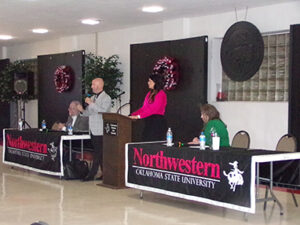By Kristen Kirtley, Senior Reporter
The Oklahoma Commission on the Status of Women hosted a community discussion in the Northwestern Student Center Ballroom on Tuesday about how to stop human trafficking.
The conversation began at 9:30 a.m. and lasted until 11 a.m. The event was free and open to the public, area high schools and the Northwestern campus. Northwestern was the host and co-sponsor of the event.
During the presentation, the commission’s panel discussed the “Stop Human Trafficking” campaign initiative it created, which is called “Not Me.”
The purpose of the initiative is to educate communities by giving them factual information that will help them know how to interpret the early signs of sex and labor trafficking.
Throughout the event, members of the panel were asked a series of questions by Jill Shero, who served as the panel moderator. Shero is the governor’s appointee to the Oklahoma Commission on the Status of Women and serves as its financial officer. People in the audience were also allowed to ask questions.
At the beginning of the presentation, a video was shown about a young girl named Eva who was a victim of sex trafficking. The video showed how Eva was manipulated into the situation, what was done to her, how she escaped and how she was helped afterwards. After Eva escaped, she received services from the Dragonfly Home, which is a non-profit in Oklahoma City that helps victims of sex trafficking get back on their feet after being trafficked.

The commission also presented a slideshow with several facts and tips people can use to protect themselves and others from being trafficked. Members of the panel mentioned that traffickers often target people who are struggling with their self-worth, children and young adults who are active on social media and people who have run away from home.
“Traffickers tend to target people who find themselves in vulnerable situations, and Oklahoma has a lot of people who are in vulnerable situations,” said panelist Melissa Eick, who is the co-founder and director of communications and development for the Dragonfly Home.
Eick explained that traffickers have the ability to know when a person is struggling and vulnerable and will take advantage of the person to benefit themselves.
Mike Hoskins, a former drug intelligence officer, said human trafficking is the most unreported crime in the world because people do not recognize the signs of it, and victims are afraid to come forward.
“Look for people who have become removed from their day-to-day routine,” Hoskins said. “Look for people who have a disconnect with their family and friends.”
Michael Snowden, director of the human trafficking unit with the Oklahoma Bureau of Narcotics, said it is hard to tell how prevalent human trafficking is because of the number of cases that go unreported.
“How do you quantify something that’s covert?” Snowden said.
“With the help of the state Legislature, the commission wants to get ahead of human traffickers by educating Oklahomans on how to recognize signs of human trafficking and measures to protect themselves,” Shero said.

